Advanced Accounting: CSR and Agency Problem Analysis Report
VerifiedAdded on 2023/01/18
|14
|3592
|51
Report
AI Summary
This report critically examines the corporate social responsibility (CSR) landscape, focusing on the agency problem through the lens of shareholder and stakeholder theories. It analyzes various academic articles to evaluate the statement "Is corporate social responsibility an agency problem". The report explores the implications of agency and shareholder perspectives on CSR activities, managerial incentives, and firm value. The literature review delves into the relationship between CSR expenditure and firm value, the alignment of managerial and shareholder interests, and the role of board attributes and corporate social performance. The analysis section synthesizes the findings from the reviewed articles, highlighting the dominance of external drivers in CSR scholarship and the need for multi-level analysis. The report underscores the importance of stakeholder management and the potential for CSR to enhance firm performance by properly managing stakeholder relationships, supporting the stakeholder theory. The report concludes by emphasizing the complex interplay of CSR, agency problems, and the pursuit of long-term value creation for firms.
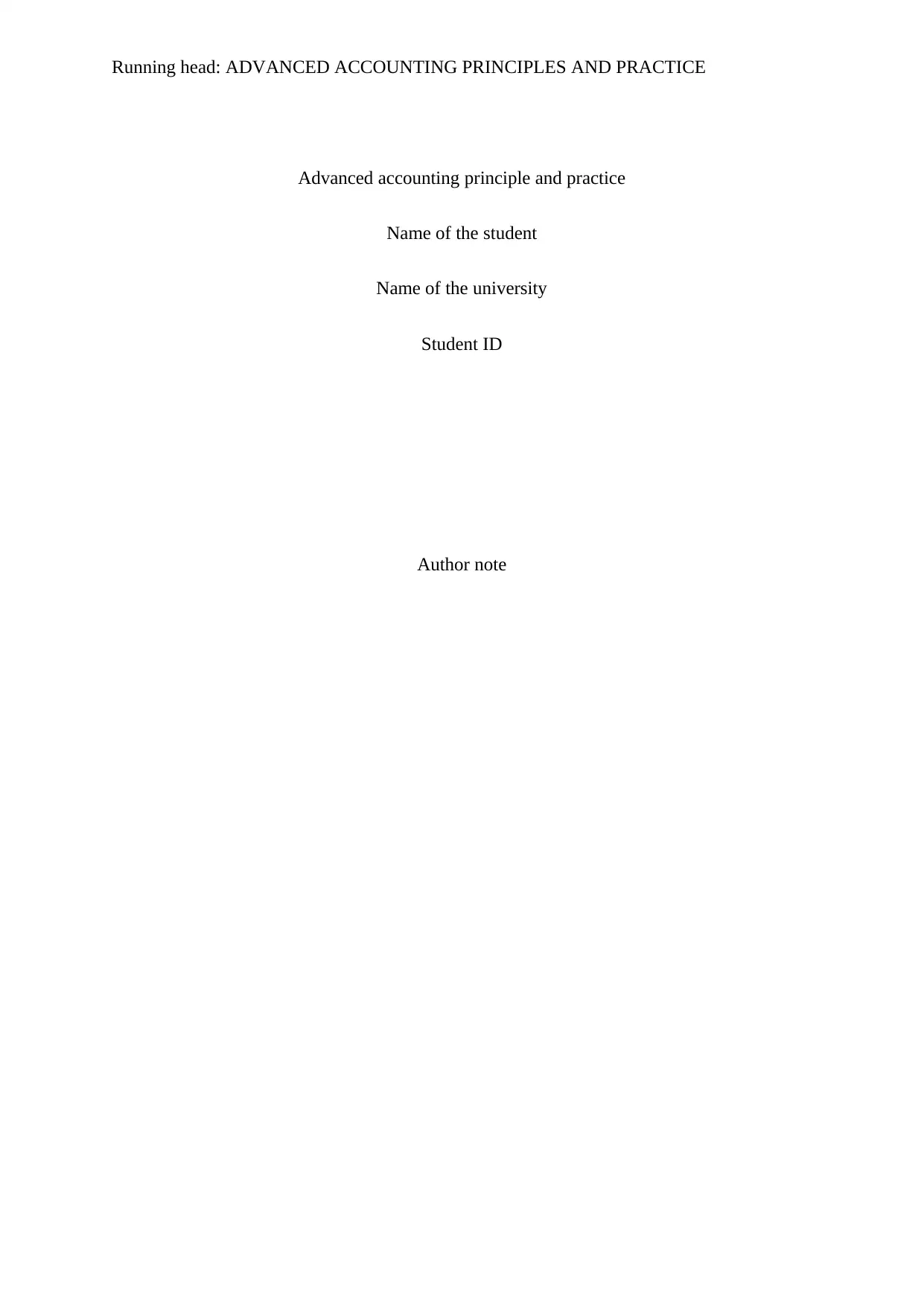
Running head: ADVANCED ACCOUNTING PRINCIPLES AND PRACTICE
Advanced accounting principle and practice
Name of the student
Name of the university
Student ID
Author note
Advanced accounting principle and practice
Name of the student
Name of the university
Student ID
Author note
Paraphrase This Document
Need a fresh take? Get an instant paraphrase of this document with our AI Paraphraser
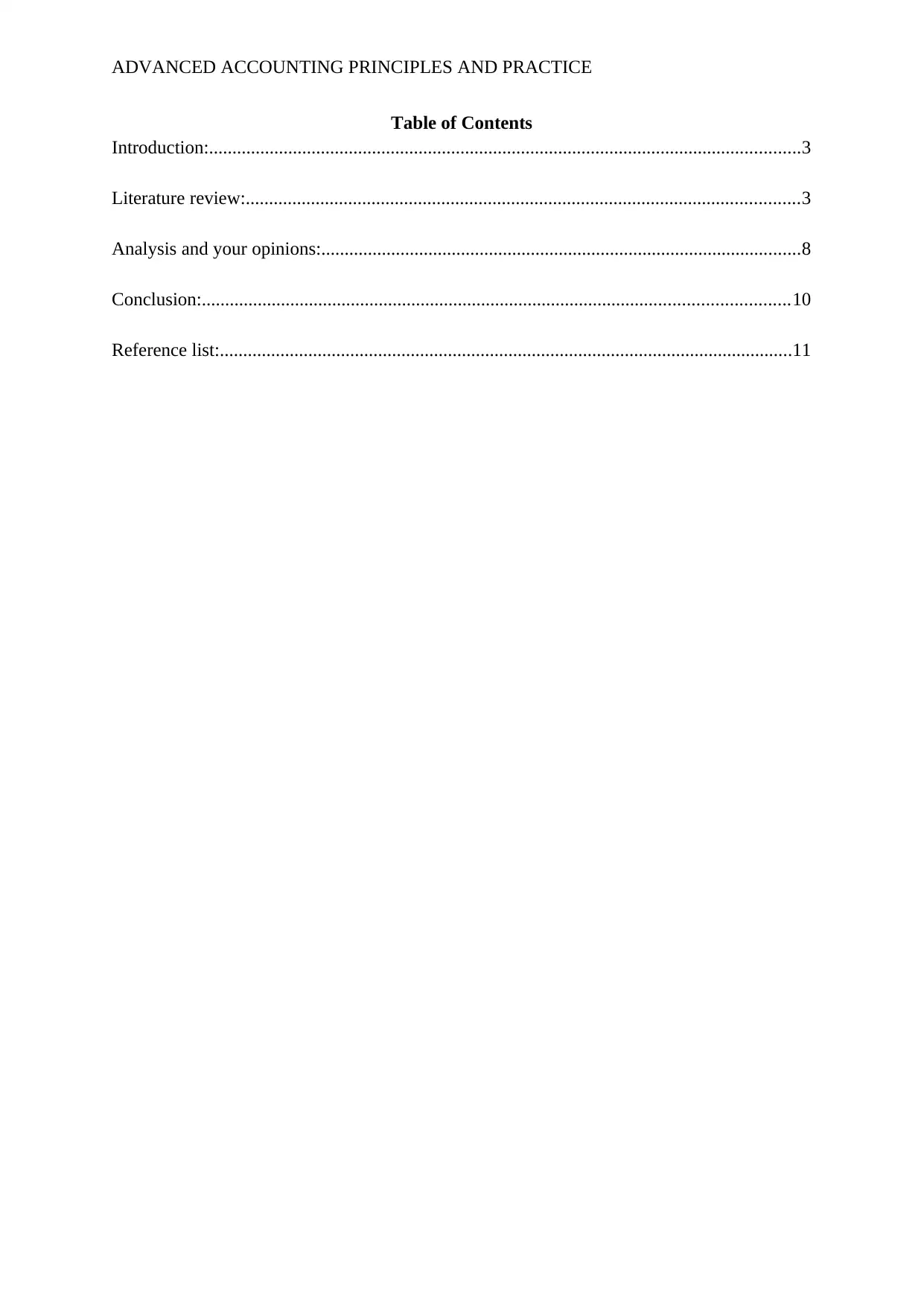
ADVANCED ACCOUNTING PRINCIPLES AND PRACTICE
Table of Contents
Introduction:...............................................................................................................................3
Literature review:.......................................................................................................................3
Analysis and your opinions:.......................................................................................................8
Conclusion:..............................................................................................................................10
Reference list:...........................................................................................................................11
Table of Contents
Introduction:...............................................................................................................................3
Literature review:.......................................................................................................................3
Analysis and your opinions:.......................................................................................................8
Conclusion:..............................................................................................................................10
Reference list:...........................................................................................................................11
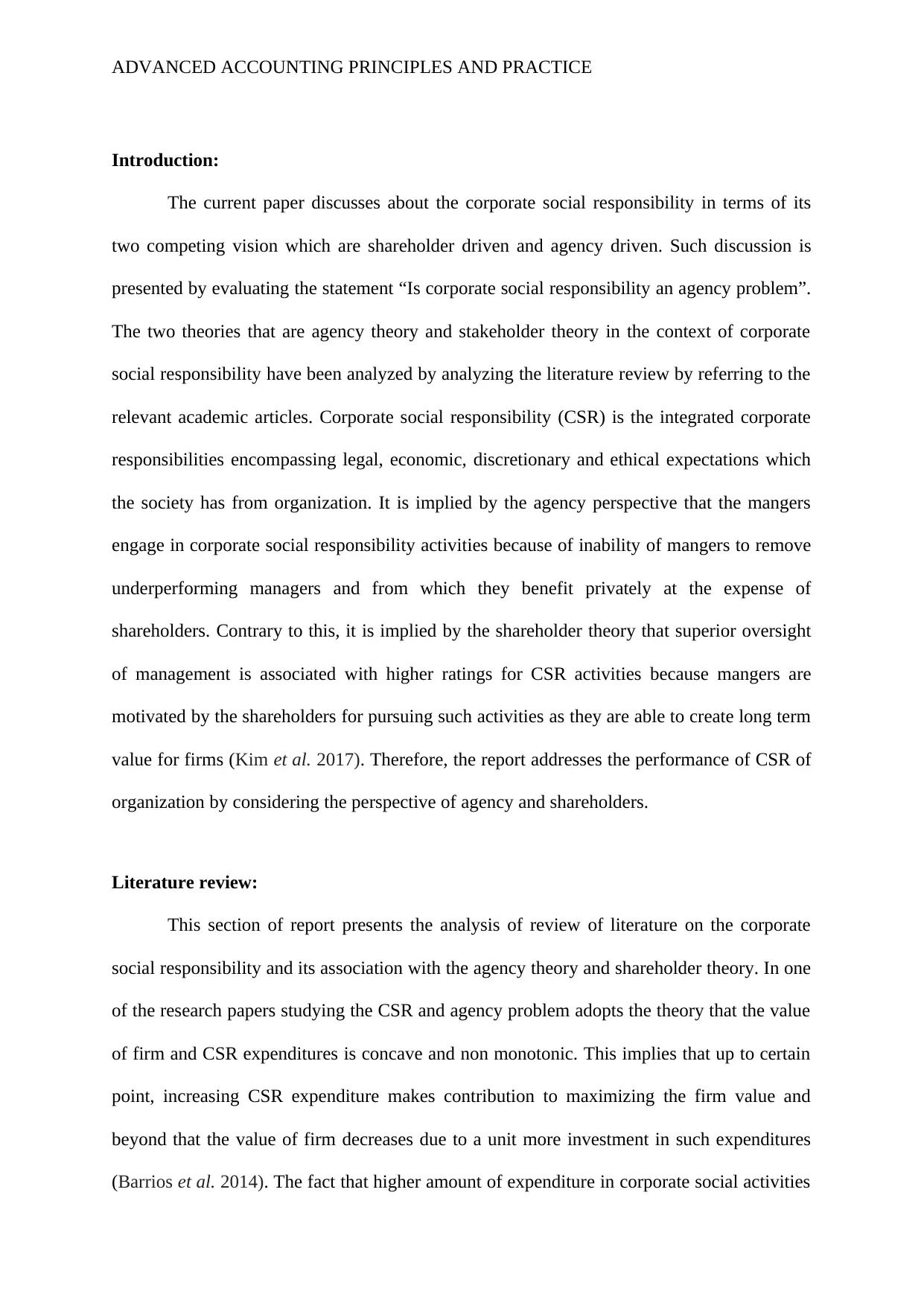
ADVANCED ACCOUNTING PRINCIPLES AND PRACTICE
Introduction:
The current paper discusses about the corporate social responsibility in terms of its
two competing vision which are shareholder driven and agency driven. Such discussion is
presented by evaluating the statement “Is corporate social responsibility an agency problem”.
The two theories that are agency theory and stakeholder theory in the context of corporate
social responsibility have been analyzed by analyzing the literature review by referring to the
relevant academic articles. Corporate social responsibility (CSR) is the integrated corporate
responsibilities encompassing legal, economic, discretionary and ethical expectations which
the society has from organization. It is implied by the agency perspective that the mangers
engage in corporate social responsibility activities because of inability of mangers to remove
underperforming managers and from which they benefit privately at the expense of
shareholders. Contrary to this, it is implied by the shareholder theory that superior oversight
of management is associated with higher ratings for CSR activities because mangers are
motivated by the shareholders for pursuing such activities as they are able to create long term
value for firms (Kim et al. 2017). Therefore, the report addresses the performance of CSR of
organization by considering the perspective of agency and shareholders.
Literature review:
This section of report presents the analysis of review of literature on the corporate
social responsibility and its association with the agency theory and shareholder theory. In one
of the research papers studying the CSR and agency problem adopts the theory that the value
of firm and CSR expenditures is concave and non monotonic. This implies that up to certain
point, increasing CSR expenditure makes contribution to maximizing the firm value and
beyond that the value of firm decreases due to a unit more investment in such expenditures
(Barrios et al. 2014). The fact that higher amount of expenditure in corporate social activities
Introduction:
The current paper discusses about the corporate social responsibility in terms of its
two competing vision which are shareholder driven and agency driven. Such discussion is
presented by evaluating the statement “Is corporate social responsibility an agency problem”.
The two theories that are agency theory and stakeholder theory in the context of corporate
social responsibility have been analyzed by analyzing the literature review by referring to the
relevant academic articles. Corporate social responsibility (CSR) is the integrated corporate
responsibilities encompassing legal, economic, discretionary and ethical expectations which
the society has from organization. It is implied by the agency perspective that the mangers
engage in corporate social responsibility activities because of inability of mangers to remove
underperforming managers and from which they benefit privately at the expense of
shareholders. Contrary to this, it is implied by the shareholder theory that superior oversight
of management is associated with higher ratings for CSR activities because mangers are
motivated by the shareholders for pursuing such activities as they are able to create long term
value for firms (Kim et al. 2017). Therefore, the report addresses the performance of CSR of
organization by considering the perspective of agency and shareholders.
Literature review:
This section of report presents the analysis of review of literature on the corporate
social responsibility and its association with the agency theory and shareholder theory. In one
of the research papers studying the CSR and agency problem adopts the theory that the value
of firm and CSR expenditures is concave and non monotonic. This implies that up to certain
point, increasing CSR expenditure makes contribution to maximizing the firm value and
beyond that the value of firm decreases due to a unit more investment in such expenditures
(Barrios et al. 2014). The fact that higher amount of expenditure in corporate social activities
⊘ This is a preview!⊘
Do you want full access?
Subscribe today to unlock all pages.

Trusted by 1+ million students worldwide
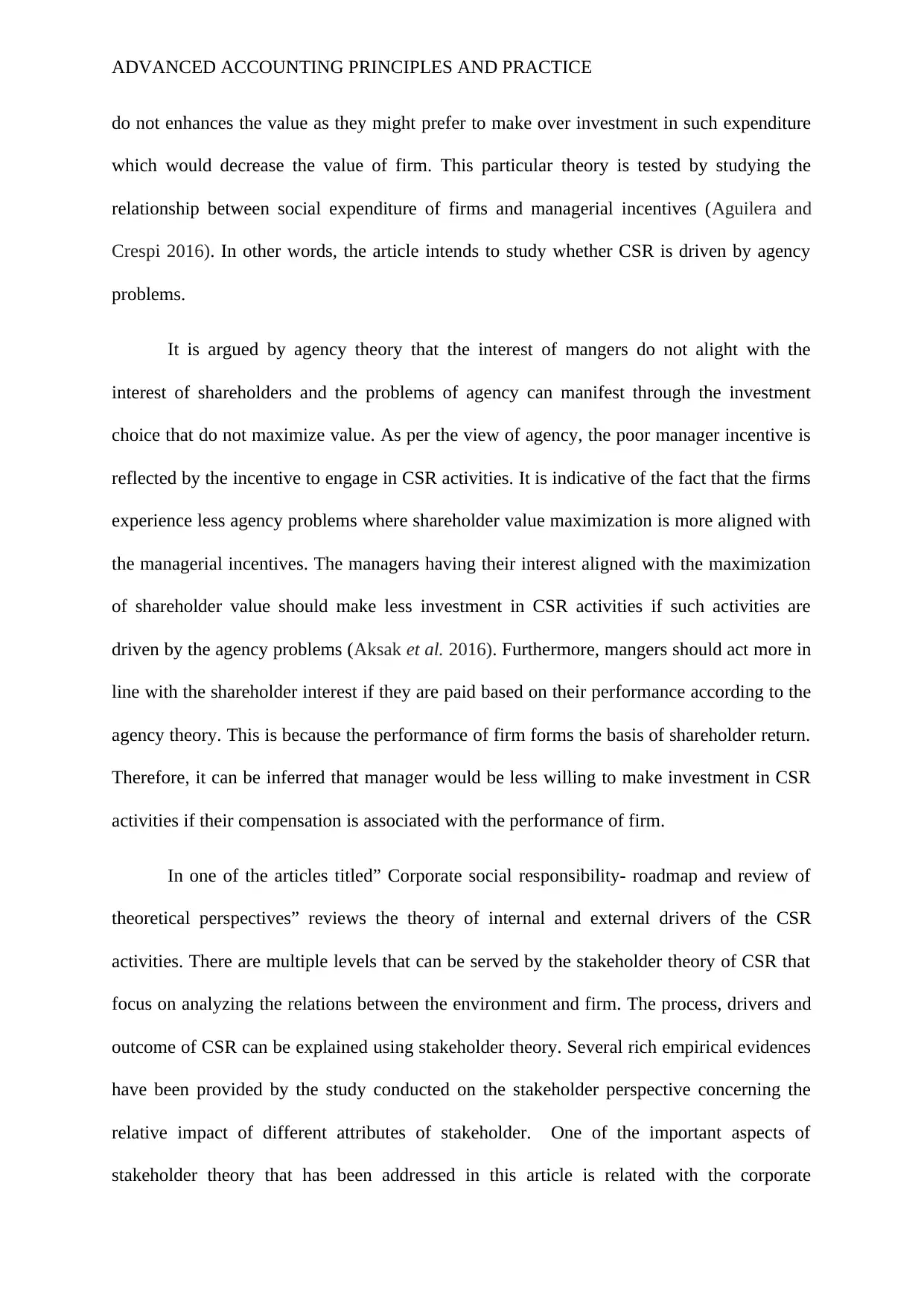
ADVANCED ACCOUNTING PRINCIPLES AND PRACTICE
do not enhances the value as they might prefer to make over investment in such expenditure
which would decrease the value of firm. This particular theory is tested by studying the
relationship between social expenditure of firms and managerial incentives (Aguilera and
Crespi 2016). In other words, the article intends to study whether CSR is driven by agency
problems.
It is argued by agency theory that the interest of mangers do not alight with the
interest of shareholders and the problems of agency can manifest through the investment
choice that do not maximize value. As per the view of agency, the poor manager incentive is
reflected by the incentive to engage in CSR activities. It is indicative of the fact that the firms
experience less agency problems where shareholder value maximization is more aligned with
the managerial incentives. The managers having their interest aligned with the maximization
of shareholder value should make less investment in CSR activities if such activities are
driven by the agency problems (Aksak et al. 2016). Furthermore, mangers should act more in
line with the shareholder interest if they are paid based on their performance according to the
agency theory. This is because the performance of firm forms the basis of shareholder return.
Therefore, it can be inferred that manager would be less willing to make investment in CSR
activities if their compensation is associated with the performance of firm.
In one of the articles titled” Corporate social responsibility- roadmap and review of
theoretical perspectives” reviews the theory of internal and external drivers of the CSR
activities. There are multiple levels that can be served by the stakeholder theory of CSR that
focus on analyzing the relations between the environment and firm. The process, drivers and
outcome of CSR can be explained using stakeholder theory. Several rich empirical evidences
have been provided by the study conducted on the stakeholder perspective concerning the
relative impact of different attributes of stakeholder. One of the important aspects of
stakeholder theory that has been addressed in this article is related with the corporate
do not enhances the value as they might prefer to make over investment in such expenditure
which would decrease the value of firm. This particular theory is tested by studying the
relationship between social expenditure of firms and managerial incentives (Aguilera and
Crespi 2016). In other words, the article intends to study whether CSR is driven by agency
problems.
It is argued by agency theory that the interest of mangers do not alight with the
interest of shareholders and the problems of agency can manifest through the investment
choice that do not maximize value. As per the view of agency, the poor manager incentive is
reflected by the incentive to engage in CSR activities. It is indicative of the fact that the firms
experience less agency problems where shareholder value maximization is more aligned with
the managerial incentives. The managers having their interest aligned with the maximization
of shareholder value should make less investment in CSR activities if such activities are
driven by the agency problems (Aksak et al. 2016). Furthermore, mangers should act more in
line with the shareholder interest if they are paid based on their performance according to the
agency theory. This is because the performance of firm forms the basis of shareholder return.
Therefore, it can be inferred that manager would be less willing to make investment in CSR
activities if their compensation is associated with the performance of firm.
In one of the articles titled” Corporate social responsibility- roadmap and review of
theoretical perspectives” reviews the theory of internal and external drivers of the CSR
activities. There are multiple levels that can be served by the stakeholder theory of CSR that
focus on analyzing the relations between the environment and firm. The process, drivers and
outcome of CSR can be explained using stakeholder theory. Several rich empirical evidences
have been provided by the study conducted on the stakeholder perspective concerning the
relative impact of different attributes of stakeholder. One of the important aspects of
stakeholder theory that has been addressed in this article is related with the corporate
Paraphrase This Document
Need a fresh take? Get an instant paraphrase of this document with our AI Paraphraser
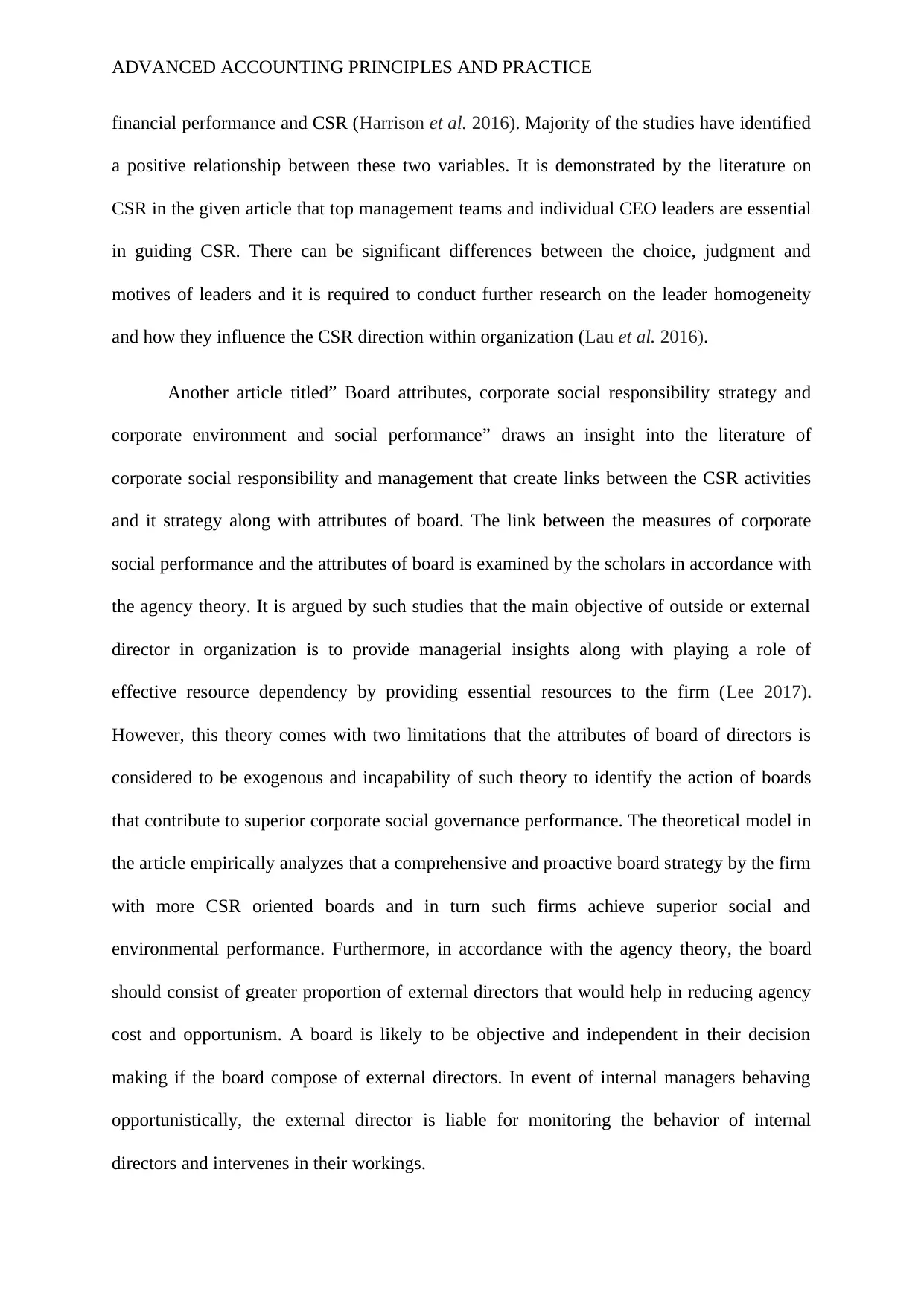
ADVANCED ACCOUNTING PRINCIPLES AND PRACTICE
financial performance and CSR (Harrison et al. 2016). Majority of the studies have identified
a positive relationship between these two variables. It is demonstrated by the literature on
CSR in the given article that top management teams and individual CEO leaders are essential
in guiding CSR. There can be significant differences between the choice, judgment and
motives of leaders and it is required to conduct further research on the leader homogeneity
and how they influence the CSR direction within organization (Lau et al. 2016).
Another article titled” Board attributes, corporate social responsibility strategy and
corporate environment and social performance” draws an insight into the literature of
corporate social responsibility and management that create links between the CSR activities
and it strategy along with attributes of board. The link between the measures of corporate
social performance and the attributes of board is examined by the scholars in accordance with
the agency theory. It is argued by such studies that the main objective of outside or external
director in organization is to provide managerial insights along with playing a role of
effective resource dependency by providing essential resources to the firm (Lee 2017).
However, this theory comes with two limitations that the attributes of board of directors is
considered to be exogenous and incapability of such theory to identify the action of boards
that contribute to superior corporate social governance performance. The theoretical model in
the article empirically analyzes that a comprehensive and proactive board strategy by the firm
with more CSR oriented boards and in turn such firms achieve superior social and
environmental performance. Furthermore, in accordance with the agency theory, the board
should consist of greater proportion of external directors that would help in reducing agency
cost and opportunism. A board is likely to be objective and independent in their decision
making if the board compose of external directors. In event of internal managers behaving
opportunistically, the external director is liable for monitoring the behavior of internal
directors and intervenes in their workings.
financial performance and CSR (Harrison et al. 2016). Majority of the studies have identified
a positive relationship between these two variables. It is demonstrated by the literature on
CSR in the given article that top management teams and individual CEO leaders are essential
in guiding CSR. There can be significant differences between the choice, judgment and
motives of leaders and it is required to conduct further research on the leader homogeneity
and how they influence the CSR direction within organization (Lau et al. 2016).
Another article titled” Board attributes, corporate social responsibility strategy and
corporate environment and social performance” draws an insight into the literature of
corporate social responsibility and management that create links between the CSR activities
and it strategy along with attributes of board. The link between the measures of corporate
social performance and the attributes of board is examined by the scholars in accordance with
the agency theory. It is argued by such studies that the main objective of outside or external
director in organization is to provide managerial insights along with playing a role of
effective resource dependency by providing essential resources to the firm (Lee 2017).
However, this theory comes with two limitations that the attributes of board of directors is
considered to be exogenous and incapability of such theory to identify the action of boards
that contribute to superior corporate social governance performance. The theoretical model in
the article empirically analyzes that a comprehensive and proactive board strategy by the firm
with more CSR oriented boards and in turn such firms achieve superior social and
environmental performance. Furthermore, in accordance with the agency theory, the board
should consist of greater proportion of external directors that would help in reducing agency
cost and opportunism. A board is likely to be objective and independent in their decision
making if the board compose of external directors. In event of internal managers behaving
opportunistically, the external director is liable for monitoring the behavior of internal
directors and intervenes in their workings.
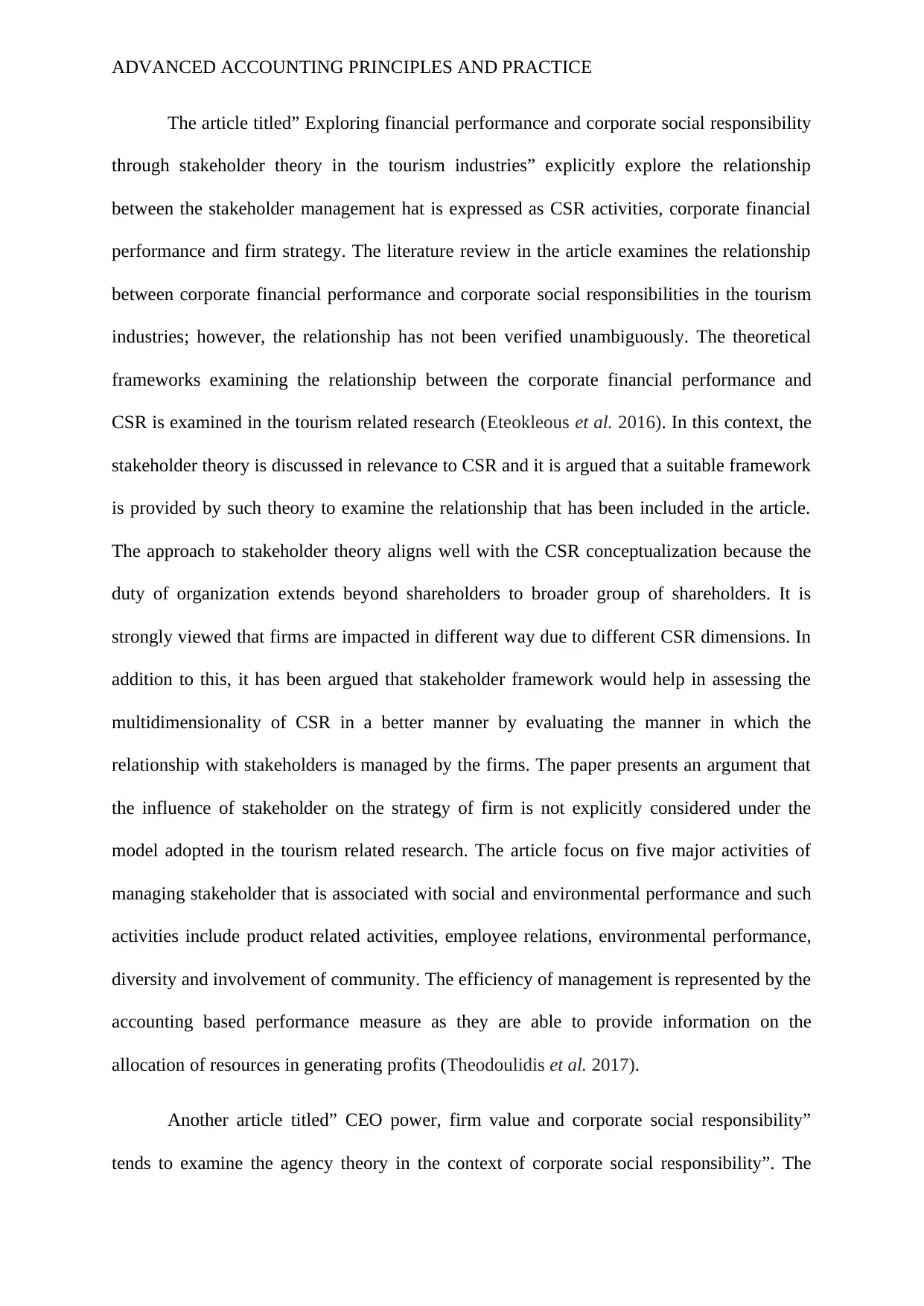
ADVANCED ACCOUNTING PRINCIPLES AND PRACTICE
The article titled” Exploring financial performance and corporate social responsibility
through stakeholder theory in the tourism industries” explicitly explore the relationship
between the stakeholder management hat is expressed as CSR activities, corporate financial
performance and firm strategy. The literature review in the article examines the relationship
between corporate financial performance and corporate social responsibilities in the tourism
industries; however, the relationship has not been verified unambiguously. The theoretical
frameworks examining the relationship between the corporate financial performance and
CSR is examined in the tourism related research (Eteokleous et al. 2016). In this context, the
stakeholder theory is discussed in relevance to CSR and it is argued that a suitable framework
is provided by such theory to examine the relationship that has been included in the article.
The approach to stakeholder theory aligns well with the CSR conceptualization because the
duty of organization extends beyond shareholders to broader group of shareholders. It is
strongly viewed that firms are impacted in different way due to different CSR dimensions. In
addition to this, it has been argued that stakeholder framework would help in assessing the
multidimensionality of CSR in a better manner by evaluating the manner in which the
relationship with stakeholders is managed by the firms. The paper presents an argument that
the influence of stakeholder on the strategy of firm is not explicitly considered under the
model adopted in the tourism related research. The article focus on five major activities of
managing stakeholder that is associated with social and environmental performance and such
activities include product related activities, employee relations, environmental performance,
diversity and involvement of community. The efficiency of management is represented by the
accounting based performance measure as they are able to provide information on the
allocation of resources in generating profits (Theodoulidis et al. 2017).
Another article titled” CEO power, firm value and corporate social responsibility”
tends to examine the agency theory in the context of corporate social responsibility”. The
The article titled” Exploring financial performance and corporate social responsibility
through stakeholder theory in the tourism industries” explicitly explore the relationship
between the stakeholder management hat is expressed as CSR activities, corporate financial
performance and firm strategy. The literature review in the article examines the relationship
between corporate financial performance and corporate social responsibilities in the tourism
industries; however, the relationship has not been verified unambiguously. The theoretical
frameworks examining the relationship between the corporate financial performance and
CSR is examined in the tourism related research (Eteokleous et al. 2016). In this context, the
stakeholder theory is discussed in relevance to CSR and it is argued that a suitable framework
is provided by such theory to examine the relationship that has been included in the article.
The approach to stakeholder theory aligns well with the CSR conceptualization because the
duty of organization extends beyond shareholders to broader group of shareholders. It is
strongly viewed that firms are impacted in different way due to different CSR dimensions. In
addition to this, it has been argued that stakeholder framework would help in assessing the
multidimensionality of CSR in a better manner by evaluating the manner in which the
relationship with stakeholders is managed by the firms. The paper presents an argument that
the influence of stakeholder on the strategy of firm is not explicitly considered under the
model adopted in the tourism related research. The article focus on five major activities of
managing stakeholder that is associated with social and environmental performance and such
activities include product related activities, employee relations, environmental performance,
diversity and involvement of community. The efficiency of management is represented by the
accounting based performance measure as they are able to provide information on the
allocation of resources in generating profits (Theodoulidis et al. 2017).
Another article titled” CEO power, firm value and corporate social responsibility”
tends to examine the agency theory in the context of corporate social responsibility”. The
⊘ This is a preview!⊘
Do you want full access?
Subscribe today to unlock all pages.

Trusted by 1+ million students worldwide
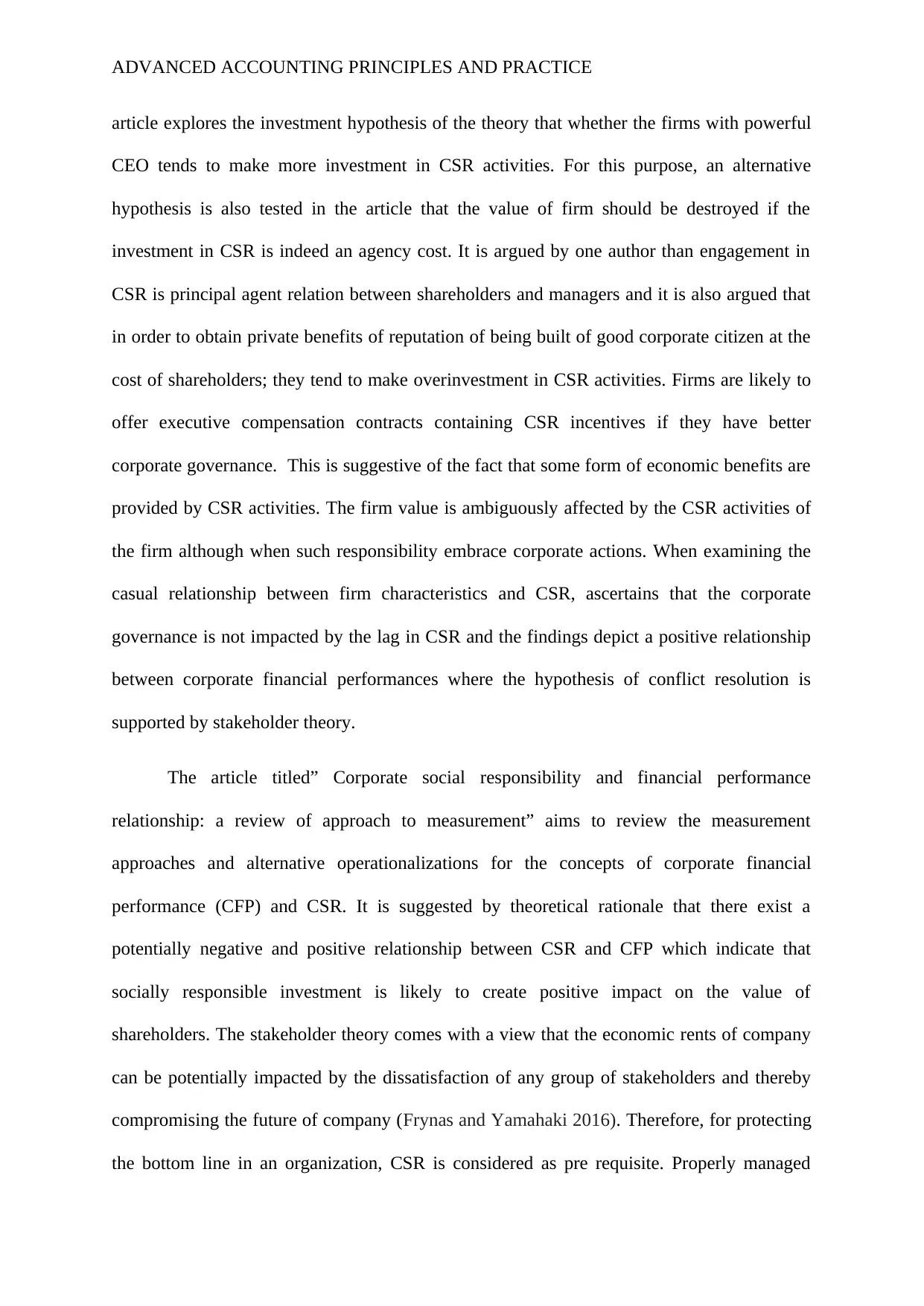
ADVANCED ACCOUNTING PRINCIPLES AND PRACTICE
article explores the investment hypothesis of the theory that whether the firms with powerful
CEO tends to make more investment in CSR activities. For this purpose, an alternative
hypothesis is also tested in the article that the value of firm should be destroyed if the
investment in CSR is indeed an agency cost. It is argued by one author than engagement in
CSR is principal agent relation between shareholders and managers and it is also argued that
in order to obtain private benefits of reputation of being built of good corporate citizen at the
cost of shareholders; they tend to make overinvestment in CSR activities. Firms are likely to
offer executive compensation contracts containing CSR incentives if they have better
corporate governance. This is suggestive of the fact that some form of economic benefits are
provided by CSR activities. The firm value is ambiguously affected by the CSR activities of
the firm although when such responsibility embrace corporate actions. When examining the
casual relationship between firm characteristics and CSR, ascertains that the corporate
governance is not impacted by the lag in CSR and the findings depict a positive relationship
between corporate financial performances where the hypothesis of conflict resolution is
supported by stakeholder theory.
The article titled” Corporate social responsibility and financial performance
relationship: a review of approach to measurement” aims to review the measurement
approaches and alternative operationalizations for the concepts of corporate financial
performance (CFP) and CSR. It is suggested by theoretical rationale that there exist a
potentially negative and positive relationship between CSR and CFP which indicate that
socially responsible investment is likely to create positive impact on the value of
shareholders. The stakeholder theory comes with a view that the economic rents of company
can be potentially impacted by the dissatisfaction of any group of stakeholders and thereby
compromising the future of company (Frynas and Yamahaki 2016). Therefore, for protecting
the bottom line in an organization, CSR is considered as pre requisite. Properly managed
article explores the investment hypothesis of the theory that whether the firms with powerful
CEO tends to make more investment in CSR activities. For this purpose, an alternative
hypothesis is also tested in the article that the value of firm should be destroyed if the
investment in CSR is indeed an agency cost. It is argued by one author than engagement in
CSR is principal agent relation between shareholders and managers and it is also argued that
in order to obtain private benefits of reputation of being built of good corporate citizen at the
cost of shareholders; they tend to make overinvestment in CSR activities. Firms are likely to
offer executive compensation contracts containing CSR incentives if they have better
corporate governance. This is suggestive of the fact that some form of economic benefits are
provided by CSR activities. The firm value is ambiguously affected by the CSR activities of
the firm although when such responsibility embrace corporate actions. When examining the
casual relationship between firm characteristics and CSR, ascertains that the corporate
governance is not impacted by the lag in CSR and the findings depict a positive relationship
between corporate financial performances where the hypothesis of conflict resolution is
supported by stakeholder theory.
The article titled” Corporate social responsibility and financial performance
relationship: a review of approach to measurement” aims to review the measurement
approaches and alternative operationalizations for the concepts of corporate financial
performance (CFP) and CSR. It is suggested by theoretical rationale that there exist a
potentially negative and positive relationship between CSR and CFP which indicate that
socially responsible investment is likely to create positive impact on the value of
shareholders. The stakeholder theory comes with a view that the economic rents of company
can be potentially impacted by the dissatisfaction of any group of stakeholders and thereby
compromising the future of company (Frynas and Yamahaki 2016). Therefore, for protecting
the bottom line in an organization, CSR is considered as pre requisite. Properly managed
Paraphrase This Document
Need a fresh take? Get an instant paraphrase of this document with our AI Paraphraser
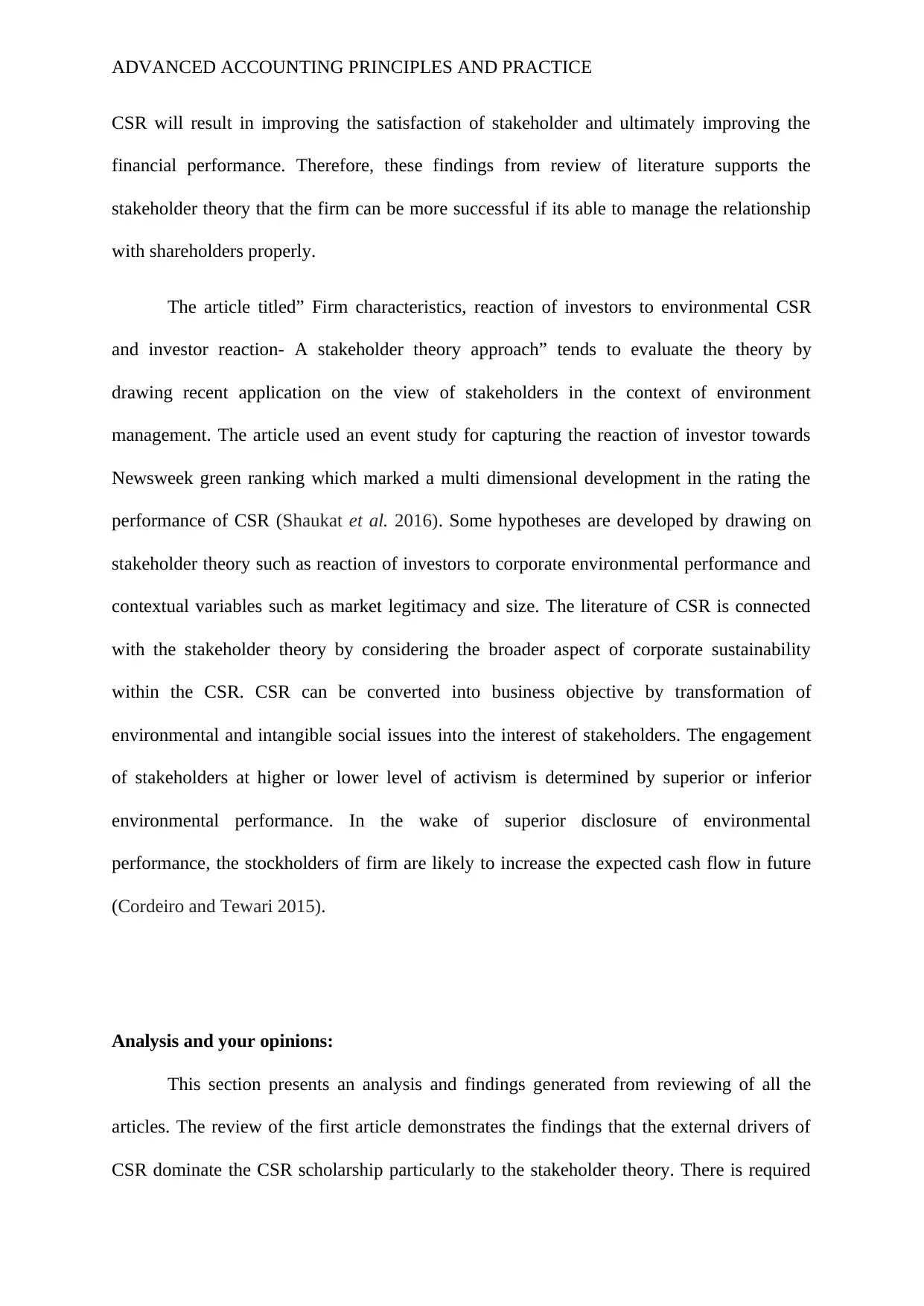
ADVANCED ACCOUNTING PRINCIPLES AND PRACTICE
CSR will result in improving the satisfaction of stakeholder and ultimately improving the
financial performance. Therefore, these findings from review of literature supports the
stakeholder theory that the firm can be more successful if its able to manage the relationship
with shareholders properly.
The article titled” Firm characteristics, reaction of investors to environmental CSR
and investor reaction- A stakeholder theory approach” tends to evaluate the theory by
drawing recent application on the view of stakeholders in the context of environment
management. The article used an event study for capturing the reaction of investor towards
Newsweek green ranking which marked a multi dimensional development in the rating the
performance of CSR (Shaukat et al. 2016). Some hypotheses are developed by drawing on
stakeholder theory such as reaction of investors to corporate environmental performance and
contextual variables such as market legitimacy and size. The literature of CSR is connected
with the stakeholder theory by considering the broader aspect of corporate sustainability
within the CSR. CSR can be converted into business objective by transformation of
environmental and intangible social issues into the interest of stakeholders. The engagement
of stakeholders at higher or lower level of activism is determined by superior or inferior
environmental performance. In the wake of superior disclosure of environmental
performance, the stockholders of firm are likely to increase the expected cash flow in future
(Cordeiro and Tewari 2015).
Analysis and your opinions:
This section presents an analysis and findings generated from reviewing of all the
articles. The review of the first article demonstrates the findings that the external drivers of
CSR dominate the CSR scholarship particularly to the stakeholder theory. There is required
CSR will result in improving the satisfaction of stakeholder and ultimately improving the
financial performance. Therefore, these findings from review of literature supports the
stakeholder theory that the firm can be more successful if its able to manage the relationship
with shareholders properly.
The article titled” Firm characteristics, reaction of investors to environmental CSR
and investor reaction- A stakeholder theory approach” tends to evaluate the theory by
drawing recent application on the view of stakeholders in the context of environment
management. The article used an event study for capturing the reaction of investor towards
Newsweek green ranking which marked a multi dimensional development in the rating the
performance of CSR (Shaukat et al. 2016). Some hypotheses are developed by drawing on
stakeholder theory such as reaction of investors to corporate environmental performance and
contextual variables such as market legitimacy and size. The literature of CSR is connected
with the stakeholder theory by considering the broader aspect of corporate sustainability
within the CSR. CSR can be converted into business objective by transformation of
environmental and intangible social issues into the interest of stakeholders. The engagement
of stakeholders at higher or lower level of activism is determined by superior or inferior
environmental performance. In the wake of superior disclosure of environmental
performance, the stockholders of firm are likely to increase the expected cash flow in future
(Cordeiro and Tewari 2015).
Analysis and your opinions:
This section presents an analysis and findings generated from reviewing of all the
articles. The review of the first article demonstrates the findings that the external drivers of
CSR dominate the CSR scholarship particularly to the stakeholder theory. There is required
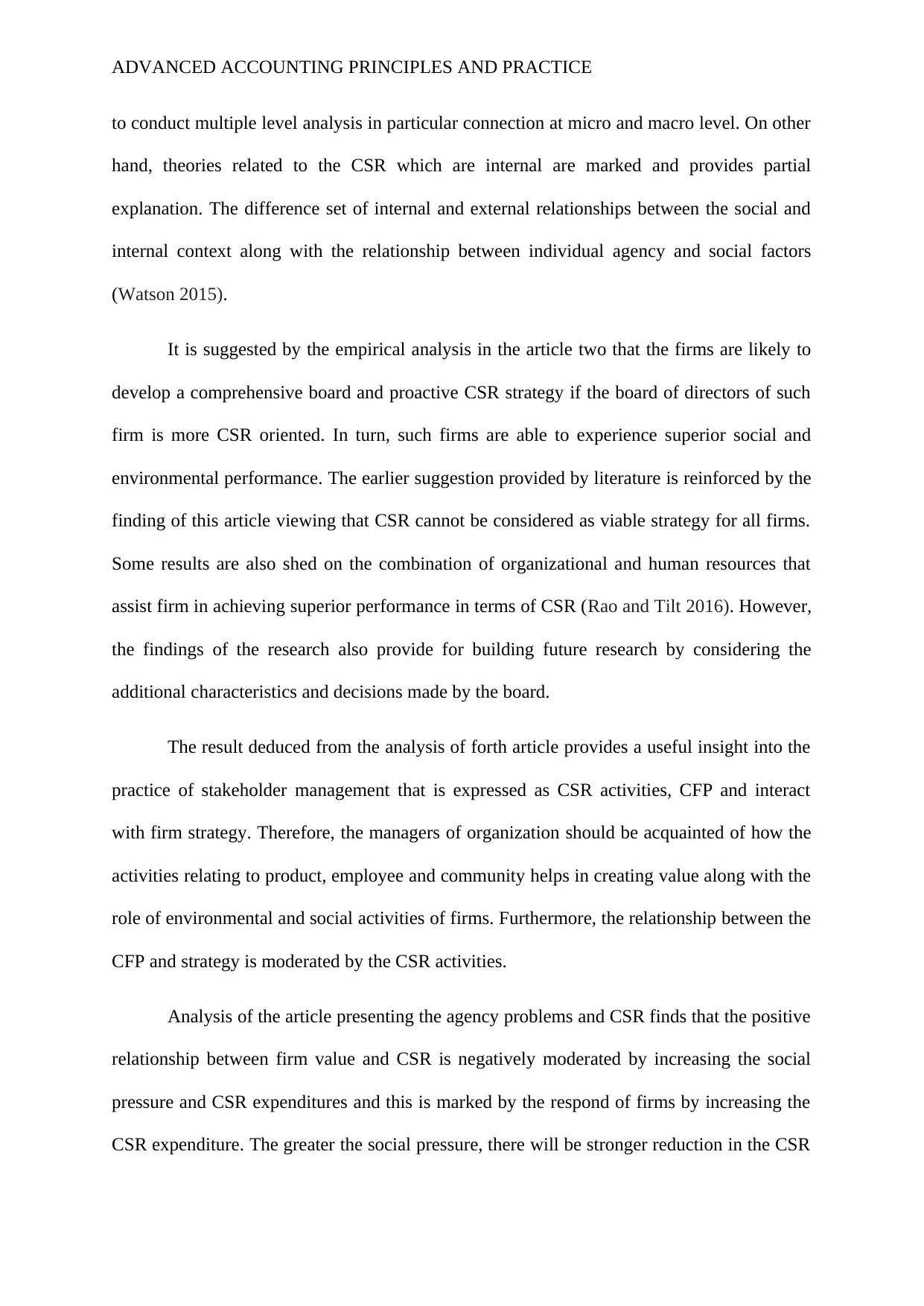
ADVANCED ACCOUNTING PRINCIPLES AND PRACTICE
to conduct multiple level analysis in particular connection at micro and macro level. On other
hand, theories related to the CSR which are internal are marked and provides partial
explanation. The difference set of internal and external relationships between the social and
internal context along with the relationship between individual agency and social factors
(Watson 2015).
It is suggested by the empirical analysis in the article two that the firms are likely to
develop a comprehensive board and proactive CSR strategy if the board of directors of such
firm is more CSR oriented. In turn, such firms are able to experience superior social and
environmental performance. The earlier suggestion provided by literature is reinforced by the
finding of this article viewing that CSR cannot be considered as viable strategy for all firms.
Some results are also shed on the combination of organizational and human resources that
assist firm in achieving superior performance in terms of CSR (Rao and Tilt 2016). However,
the findings of the research also provide for building future research by considering the
additional characteristics and decisions made by the board.
The result deduced from the analysis of forth article provides a useful insight into the
practice of stakeholder management that is expressed as CSR activities, CFP and interact
with firm strategy. Therefore, the managers of organization should be acquainted of how the
activities relating to product, employee and community helps in creating value along with the
role of environmental and social activities of firms. Furthermore, the relationship between the
CFP and strategy is moderated by the CSR activities.
Analysis of the article presenting the agency problems and CSR finds that the positive
relationship between firm value and CSR is negatively moderated by increasing the social
pressure and CSR expenditures and this is marked by the respond of firms by increasing the
CSR expenditure. The greater the social pressure, there will be stronger reduction in the CSR
to conduct multiple level analysis in particular connection at micro and macro level. On other
hand, theories related to the CSR which are internal are marked and provides partial
explanation. The difference set of internal and external relationships between the social and
internal context along with the relationship between individual agency and social factors
(Watson 2015).
It is suggested by the empirical analysis in the article two that the firms are likely to
develop a comprehensive board and proactive CSR strategy if the board of directors of such
firm is more CSR oriented. In turn, such firms are able to experience superior social and
environmental performance. The earlier suggestion provided by literature is reinforced by the
finding of this article viewing that CSR cannot be considered as viable strategy for all firms.
Some results are also shed on the combination of organizational and human resources that
assist firm in achieving superior performance in terms of CSR (Rao and Tilt 2016). However,
the findings of the research also provide for building future research by considering the
additional characteristics and decisions made by the board.
The result deduced from the analysis of forth article provides a useful insight into the
practice of stakeholder management that is expressed as CSR activities, CFP and interact
with firm strategy. Therefore, the managers of organization should be acquainted of how the
activities relating to product, employee and community helps in creating value along with the
role of environmental and social activities of firms. Furthermore, the relationship between the
CFP and strategy is moderated by the CSR activities.
Analysis of the article presenting the agency problems and CSR finds that the positive
relationship between firm value and CSR is negatively moderated by increasing the social
pressure and CSR expenditures and this is marked by the respond of firms by increasing the
CSR expenditure. The greater the social pressure, there will be stronger reduction in the CSR
⊘ This is a preview!⊘
Do you want full access?
Subscribe today to unlock all pages.

Trusted by 1+ million students worldwide
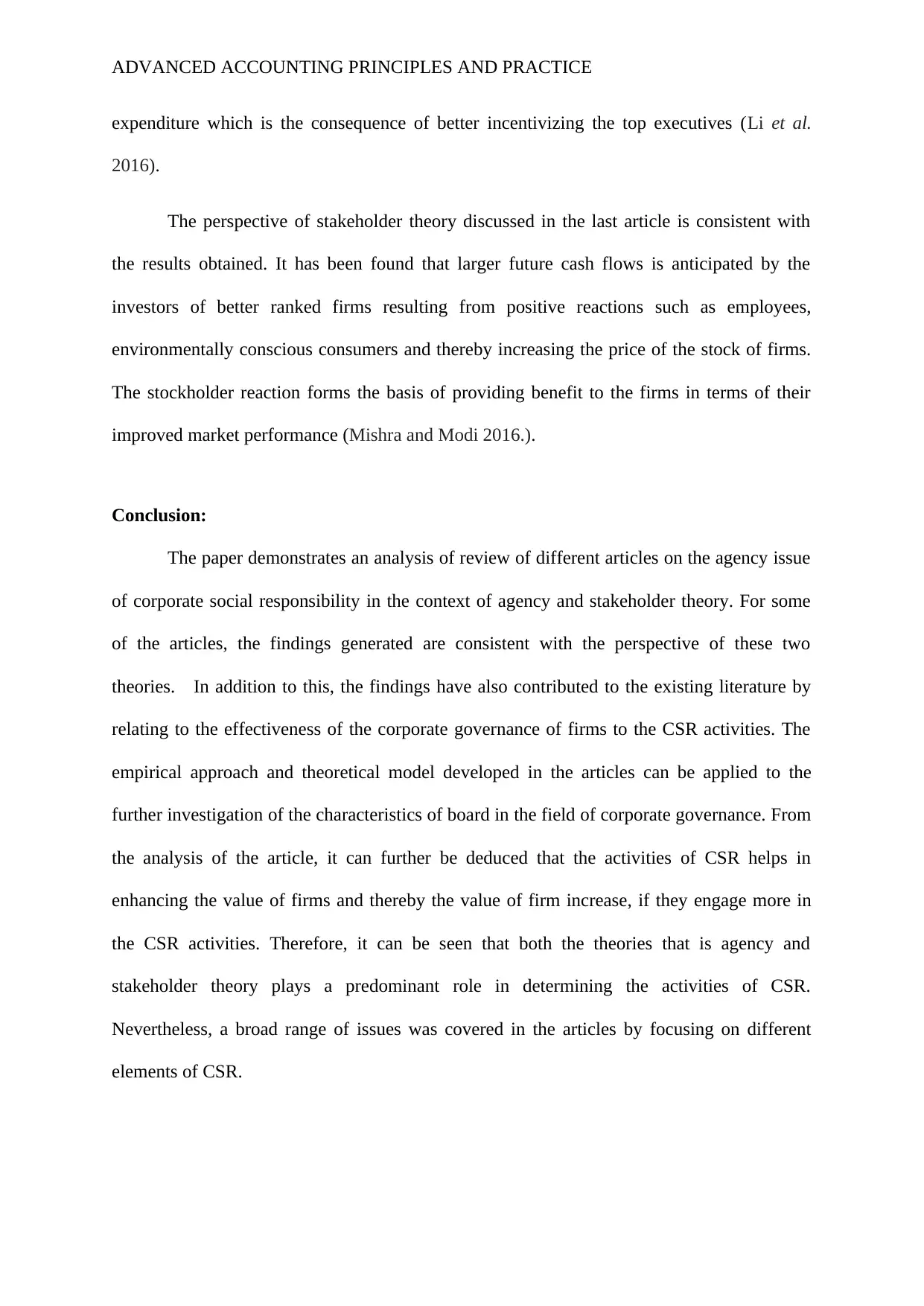
ADVANCED ACCOUNTING PRINCIPLES AND PRACTICE
expenditure which is the consequence of better incentivizing the top executives (Li et al.
2016).
The perspective of stakeholder theory discussed in the last article is consistent with
the results obtained. It has been found that larger future cash flows is anticipated by the
investors of better ranked firms resulting from positive reactions such as employees,
environmentally conscious consumers and thereby increasing the price of the stock of firms.
The stockholder reaction forms the basis of providing benefit to the firms in terms of their
improved market performance (Mishra and Modi 2016.).
Conclusion:
The paper demonstrates an analysis of review of different articles on the agency issue
of corporate social responsibility in the context of agency and stakeholder theory. For some
of the articles, the findings generated are consistent with the perspective of these two
theories. In addition to this, the findings have also contributed to the existing literature by
relating to the effectiveness of the corporate governance of firms to the CSR activities. The
empirical approach and theoretical model developed in the articles can be applied to the
further investigation of the characteristics of board in the field of corporate governance. From
the analysis of the article, it can further be deduced that the activities of CSR helps in
enhancing the value of firms and thereby the value of firm increase, if they engage more in
the CSR activities. Therefore, it can be seen that both the theories that is agency and
stakeholder theory plays a predominant role in determining the activities of CSR.
Nevertheless, a broad range of issues was covered in the articles by focusing on different
elements of CSR.
expenditure which is the consequence of better incentivizing the top executives (Li et al.
2016).
The perspective of stakeholder theory discussed in the last article is consistent with
the results obtained. It has been found that larger future cash flows is anticipated by the
investors of better ranked firms resulting from positive reactions such as employees,
environmentally conscious consumers and thereby increasing the price of the stock of firms.
The stockholder reaction forms the basis of providing benefit to the firms in terms of their
improved market performance (Mishra and Modi 2016.).
Conclusion:
The paper demonstrates an analysis of review of different articles on the agency issue
of corporate social responsibility in the context of agency and stakeholder theory. For some
of the articles, the findings generated are consistent with the perspective of these two
theories. In addition to this, the findings have also contributed to the existing literature by
relating to the effectiveness of the corporate governance of firms to the CSR activities. The
empirical approach and theoretical model developed in the articles can be applied to the
further investigation of the characteristics of board in the field of corporate governance. From
the analysis of the article, it can further be deduced that the activities of CSR helps in
enhancing the value of firms and thereby the value of firm increase, if they engage more in
the CSR activities. Therefore, it can be seen that both the theories that is agency and
stakeholder theory plays a predominant role in determining the activities of CSR.
Nevertheless, a broad range of issues was covered in the articles by focusing on different
elements of CSR.
Paraphrase This Document
Need a fresh take? Get an instant paraphrase of this document with our AI Paraphraser
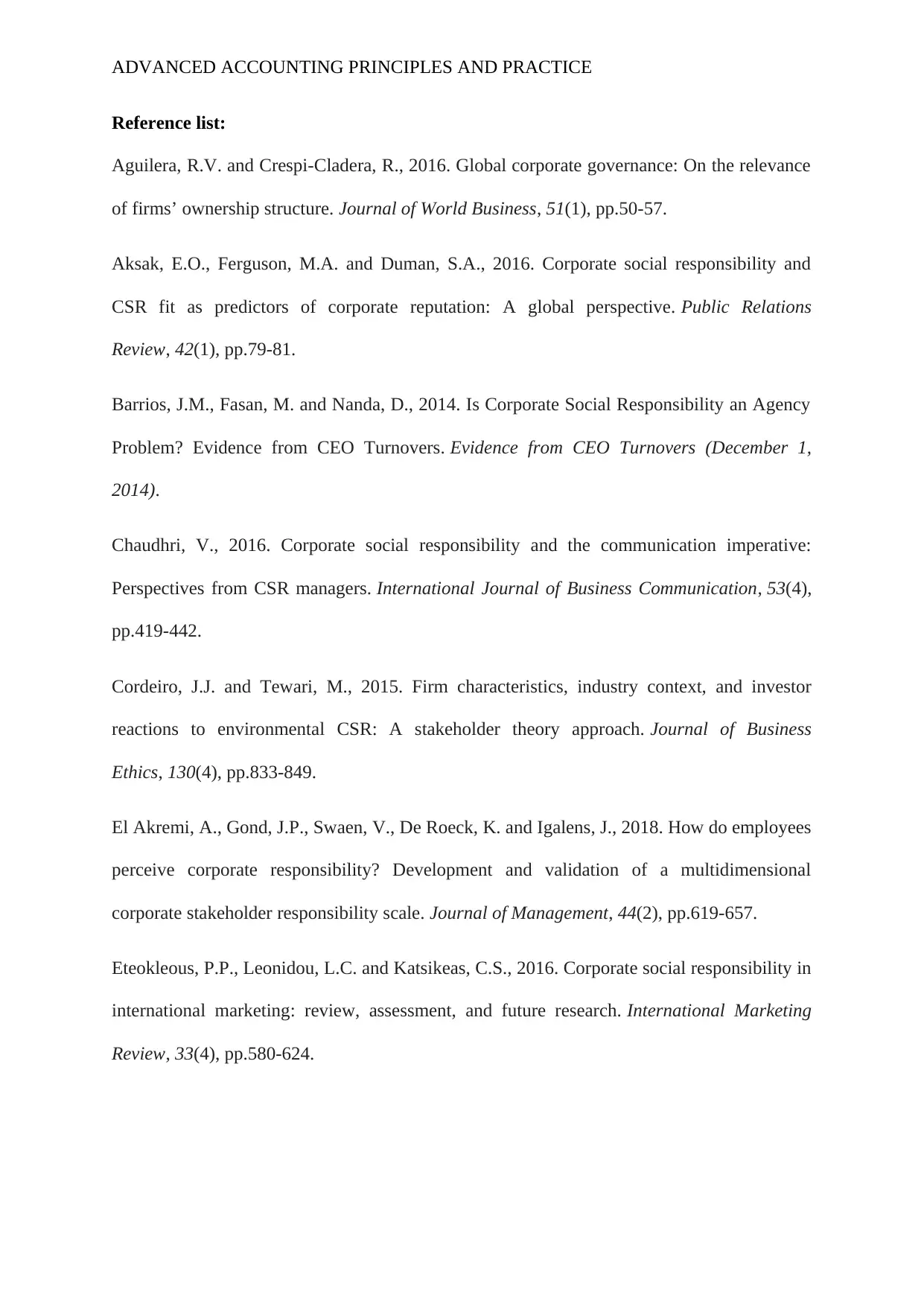
ADVANCED ACCOUNTING PRINCIPLES AND PRACTICE
Reference list:
Aguilera, R.V. and Crespi-Cladera, R., 2016. Global corporate governance: On the relevance
of firms’ ownership structure. Journal of World Business, 51(1), pp.50-57.
Aksak, E.O., Ferguson, M.A. and Duman, S.A., 2016. Corporate social responsibility and
CSR fit as predictors of corporate reputation: A global perspective. Public Relations
Review, 42(1), pp.79-81.
Barrios, J.M., Fasan, M. and Nanda, D., 2014. Is Corporate Social Responsibility an Agency
Problem? Evidence from CEO Turnovers. Evidence from CEO Turnovers (December 1,
2014).
Chaudhri, V., 2016. Corporate social responsibility and the communication imperative:
Perspectives from CSR managers. International Journal of Business Communication, 53(4),
pp.419-442.
Cordeiro, J.J. and Tewari, M., 2015. Firm characteristics, industry context, and investor
reactions to environmental CSR: A stakeholder theory approach. Journal of Business
Ethics, 130(4), pp.833-849.
El Akremi, A., Gond, J.P., Swaen, V., De Roeck, K. and Igalens, J., 2018. How do employees
perceive corporate responsibility? Development and validation of a multidimensional
corporate stakeholder responsibility scale. Journal of Management, 44(2), pp.619-657.
Eteokleous, P.P., Leonidou, L.C. and Katsikeas, C.S., 2016. Corporate social responsibility in
international marketing: review, assessment, and future research. International Marketing
Review, 33(4), pp.580-624.
Reference list:
Aguilera, R.V. and Crespi-Cladera, R., 2016. Global corporate governance: On the relevance
of firms’ ownership structure. Journal of World Business, 51(1), pp.50-57.
Aksak, E.O., Ferguson, M.A. and Duman, S.A., 2016. Corporate social responsibility and
CSR fit as predictors of corporate reputation: A global perspective. Public Relations
Review, 42(1), pp.79-81.
Barrios, J.M., Fasan, M. and Nanda, D., 2014. Is Corporate Social Responsibility an Agency
Problem? Evidence from CEO Turnovers. Evidence from CEO Turnovers (December 1,
2014).
Chaudhri, V., 2016. Corporate social responsibility and the communication imperative:
Perspectives from CSR managers. International Journal of Business Communication, 53(4),
pp.419-442.
Cordeiro, J.J. and Tewari, M., 2015. Firm characteristics, industry context, and investor
reactions to environmental CSR: A stakeholder theory approach. Journal of Business
Ethics, 130(4), pp.833-849.
El Akremi, A., Gond, J.P., Swaen, V., De Roeck, K. and Igalens, J., 2018. How do employees
perceive corporate responsibility? Development and validation of a multidimensional
corporate stakeholder responsibility scale. Journal of Management, 44(2), pp.619-657.
Eteokleous, P.P., Leonidou, L.C. and Katsikeas, C.S., 2016. Corporate social responsibility in
international marketing: review, assessment, and future research. International Marketing
Review, 33(4), pp.580-624.
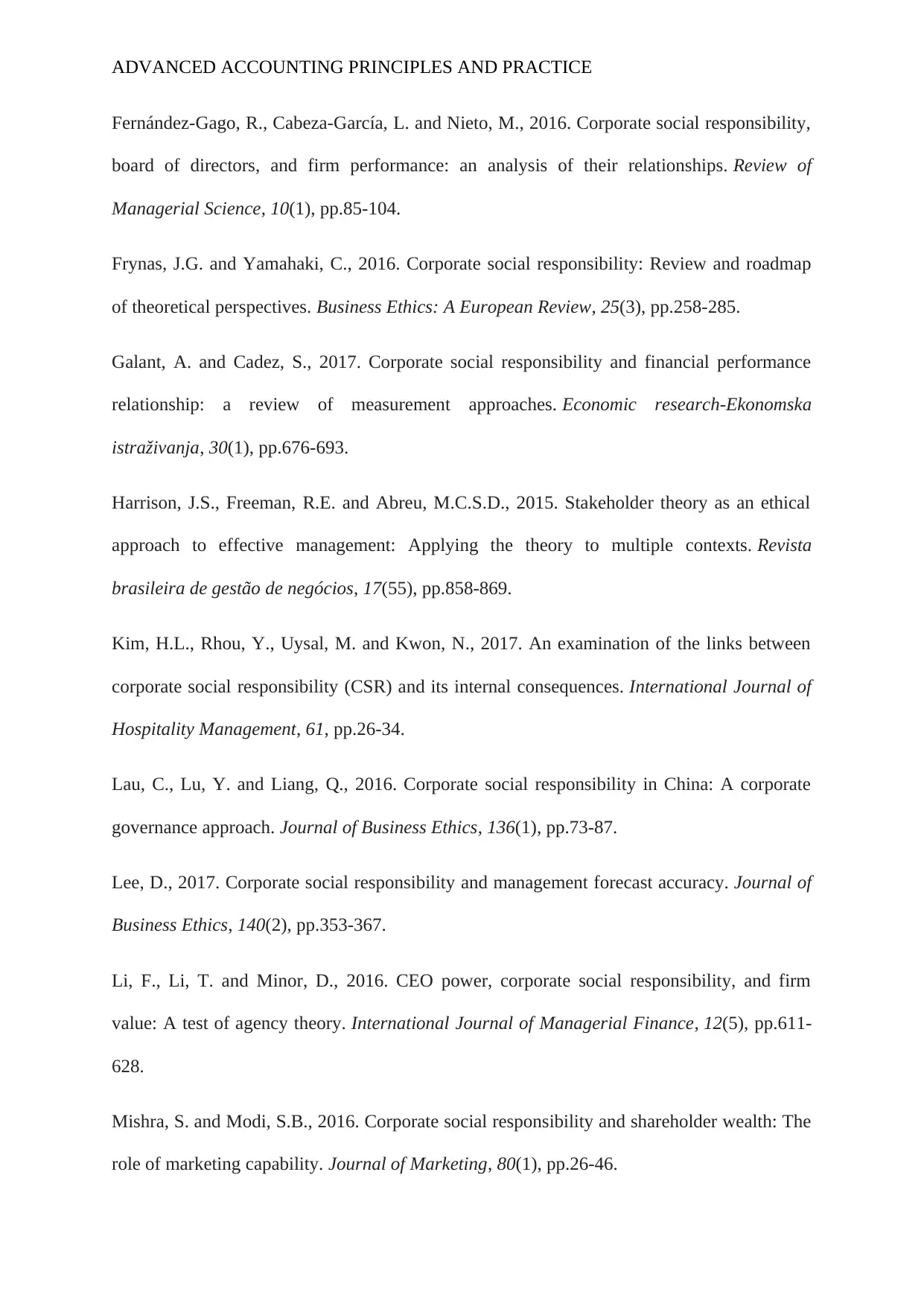
ADVANCED ACCOUNTING PRINCIPLES AND PRACTICE
Fernández-Gago, R., Cabeza-García, L. and Nieto, M., 2016. Corporate social responsibility,
board of directors, and firm performance: an analysis of their relationships. Review of
Managerial Science, 10(1), pp.85-104.
Frynas, J.G. and Yamahaki, C., 2016. Corporate social responsibility: Review and roadmap
of theoretical perspectives. Business Ethics: A European Review, 25(3), pp.258-285.
Galant, A. and Cadez, S., 2017. Corporate social responsibility and financial performance
relationship: a review of measurement approaches. Economic research-Ekonomska
istraživanja, 30(1), pp.676-693.
Harrison, J.S., Freeman, R.E. and Abreu, M.C.S.D., 2015. Stakeholder theory as an ethical
approach to effective management: Applying the theory to multiple contexts. Revista
brasileira de gestão de negócios, 17(55), pp.858-869.
Kim, H.L., Rhou, Y., Uysal, M. and Kwon, N., 2017. An examination of the links between
corporate social responsibility (CSR) and its internal consequences. International Journal of
Hospitality Management, 61, pp.26-34.
Lau, C., Lu, Y. and Liang, Q., 2016. Corporate social responsibility in China: A corporate
governance approach. Journal of Business Ethics, 136(1), pp.73-87.
Lee, D., 2017. Corporate social responsibility and management forecast accuracy. Journal of
Business Ethics, 140(2), pp.353-367.
Li, F., Li, T. and Minor, D., 2016. CEO power, corporate social responsibility, and firm
value: A test of agency theory. International Journal of Managerial Finance, 12(5), pp.611-
628.
Mishra, S. and Modi, S.B., 2016. Corporate social responsibility and shareholder wealth: The
role of marketing capability. Journal of Marketing, 80(1), pp.26-46.
Fernández-Gago, R., Cabeza-García, L. and Nieto, M., 2016. Corporate social responsibility,
board of directors, and firm performance: an analysis of their relationships. Review of
Managerial Science, 10(1), pp.85-104.
Frynas, J.G. and Yamahaki, C., 2016. Corporate social responsibility: Review and roadmap
of theoretical perspectives. Business Ethics: A European Review, 25(3), pp.258-285.
Galant, A. and Cadez, S., 2017. Corporate social responsibility and financial performance
relationship: a review of measurement approaches. Economic research-Ekonomska
istraživanja, 30(1), pp.676-693.
Harrison, J.S., Freeman, R.E. and Abreu, M.C.S.D., 2015. Stakeholder theory as an ethical
approach to effective management: Applying the theory to multiple contexts. Revista
brasileira de gestão de negócios, 17(55), pp.858-869.
Kim, H.L., Rhou, Y., Uysal, M. and Kwon, N., 2017. An examination of the links between
corporate social responsibility (CSR) and its internal consequences. International Journal of
Hospitality Management, 61, pp.26-34.
Lau, C., Lu, Y. and Liang, Q., 2016. Corporate social responsibility in China: A corporate
governance approach. Journal of Business Ethics, 136(1), pp.73-87.
Lee, D., 2017. Corporate social responsibility and management forecast accuracy. Journal of
Business Ethics, 140(2), pp.353-367.
Li, F., Li, T. and Minor, D., 2016. CEO power, corporate social responsibility, and firm
value: A test of agency theory. International Journal of Managerial Finance, 12(5), pp.611-
628.
Mishra, S. and Modi, S.B., 2016. Corporate social responsibility and shareholder wealth: The
role of marketing capability. Journal of Marketing, 80(1), pp.26-46.
⊘ This is a preview!⊘
Do you want full access?
Subscribe today to unlock all pages.

Trusted by 1+ million students worldwide
1 out of 14
Related Documents
Your All-in-One AI-Powered Toolkit for Academic Success.
+13062052269
info@desklib.com
Available 24*7 on WhatsApp / Email
![[object Object]](/_next/static/media/star-bottom.7253800d.svg)
Unlock your academic potential
Copyright © 2020–2026 A2Z Services. All Rights Reserved. Developed and managed by ZUCOL.





